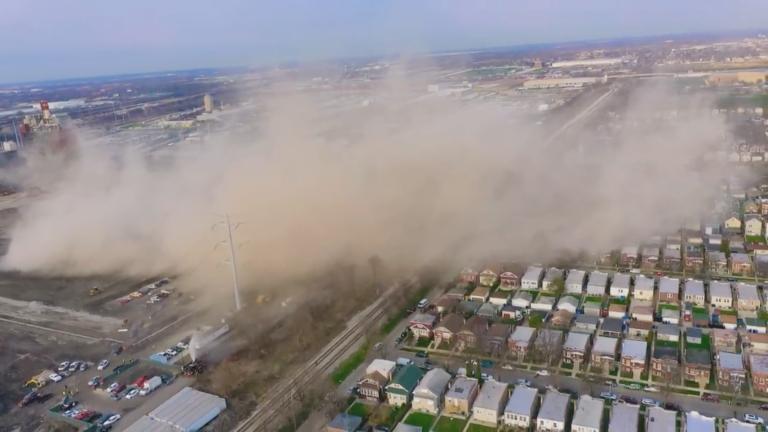Video: Reyna Torres Mendivil, consul general of Mexico in Chicago, joins “Chicago Tonight: Latino Voices” to discuss the hurricane’s impact. (Produced by Acacia Hernández)
ACAPULCO, Mexico (AP) — Survivors of a Category 5 storm that killed at least 27 people as it devastated Mexico’s resort city of Acapulco spent Thursday searching for acquaintances and necessities and hoping that aid would come quickly in the wake of Hurricane Otis.
The Pacific storm had strengthened with shocking swiftness before slamming into the coast early Wednesday, and the Mexican government deployed around 10,000 troops to deal with the aftermath. But equipment to move tons of mud and fallen trees from the streets was slow in arriving.
Resentment grew Thursday in impoverished neighborhoods as residents worried that government attention would go to repairing infrastructure for the city's economic engine of tourism rather than helping the neediest.
Flora Contreras Santos, a housewife from a poor neighborhood on the outskirts of the city, sought help in looking for a 3-year-old girl who was swept away from her mother in a mudslide. She went from soldier to soldier trying to interest any one of them in the tragedy that occurred on her street at the height of the storm.
“The mountain came down on them. The mud took her from the mother’s arms,” Contreras said. “We need help, the mother is in bad shape and we can’t find the girl.”
Even as army bulldozers began clearing knee-deep mud from Acapulco’s main boulevards, Contreras' pleas did not appear to move any of the soldiers to action.
President Andrés Manuel López Obrador went by road Wednesday after the hurricane hit the iconic city on Mexico 's Pacific coast. At least four people remained missing. It was unclear if the 3-year-old girl was counted among them.
The president said Otis had toppled every power-line pole in the zone where it hit on Wednesday, leaving much of the city of 1 million without electricity. Otis turned from mild to monster in record time, and scientists were struggling to figure out how — and why they didn’t see it coming.
“The people sheltered, protected themselves and that’s why fortunately there weren’t more tragedies, loss of human life,” López Obrador said.
Acapulco's municipal water system was down and some 500,000 homes lost power. López Obrador said that restoring power was a top priority.
Brown floodwaters extended for miles in some areas. Many residents were taking basic items from stores to survive. Others left with pricier goods, in widespread rampages through the area's stores.
As cell phone signals began to return to some parts of the city, residents organized themselves with the help of friends and relatives living in other parts of Mexico and the United States. They joined together by neighborhood using online messaging platforms like WhatsApp. On Thursday there were some 1,000 people in 40 chats.
They shared photos of flooded neighborhoods and tips for finding cell phone signals, while asking for information about loved ones that they had not heard from. When someone joins from a neighborhood they're asked by people outside the city to look for other residents there.
Juan Pablo Lopez, 26, had been talking to his wife when their call was cut off early Wednesday as Otis made landfall. She had returned to Acapulco to be with her family and give birth to their son a month ago. Lopez was at home in Cancun.
“I’m very worried for my newborn son,” he said.
With no information coming in Wednesday, he created an online chat with friends and family from Guerrero state, where Acapulco is the largest city. He also invited friends who had emigrated to the U.S. and asked them to add their local contacts.
“We started to cross-reference information, to share what we found, almost like a WhatApp newspaper,” Lopez said.
By Thursday afternoon, however, he still had not heard word about his wife and son.
The surreal was commonplace in the storm-wrecked city, as residents emptied the area's stores of goods.
Ricardo Díaz, a self-employed laborer, stood Thursday with two fistfuls of live chickens he clutched by their legs. A chicken company had given him the chickens, Diaz said.
A woman nearby pushed an office chair loaded with artificial Christmas wreaths and toilet paper through the streets.
Díaz looked on in dismay as people carried armfuls of goods out of a damaged store.
“They’re going to close these stores and that hurts Acapulco,” Díaz said.
Edith Villanueva, holding her daughter, worried about what would happen to Acapulco in the long term. She worked at a cell phone store that had already been cleaned out.
“They already stole all of the phones,” she said. “It’s one thing to steal food, but people are abusing it.”
Some residents said it could take a year for Acapulco to recover; with no power, gasoline, little cell coverage and hotels wrecked by the hurricane, the task seemed impossible.
Marketing expert Antonio Esparza was one of the few optimistic ones, even as he sat trapped in the snarled traffic of the aftermath.
“This is going to improve Acapulco, because it will force the government to pay attention,” he said.
Large stores that had their merchandise taken were not restocking their shelves, meaning finding goods could become harder. But street-produce vendors were doing a brisk business in some neighborhoods as residents sought fresh food.
The once-sleek beachfront hotels in Acapulco looked like toothless, shattered hulks after the Category 5 storm blew out hundreds — possibly thousands — of windows.
Hundreds of trucks from the government electricity company arrived in Acapulco on Wednesday but downed electricity lines were in feet of mud and water.
It took nearly all day Wednesday for authorities to partially reopen the main highway connecting Acapulco to the state capital Chilpancingo and Mexico City. The vital ground link allowed dozens of emergency vehicles, personnel and trucks carrying supplies to reach the battered port.
Acapulco’s commercial and military airports were still too badly damaged to resume flights, though López Obrador said the plan was to establish an air bridge to move in resources.
Acapulco is at the foot of steep mountains. Luxury homes and slums alike cover the hillsides with views of the glistening Pacific Ocean. Once drawing Hollywood stars for its nightlife, sport fishing and cliff diving shows, the port has in recent years fallen victim to competing organized crime groups that have sunk the city into violence, driving away many international tourists.








